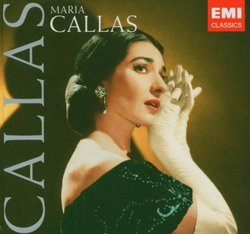| All Artists: Maria Callas Title: Callas-Luxury Edition w/Book Members Wishing: 0 Total Copies: 0 Label: Angel Release Date: 1/1/2007 Album Type: Import Genre: Classical Style: Number of Discs: 2 SwapaCD Credits: 2 Other Editions: Lyric & Coloratura Arias by Maria Callas (EMI's Great Recordings of the Century) UPC: 724356298323 |
Search - Maria Callas :: Callas-Luxury Edition w/Book
 | Maria Callas Callas-Luxury Edition w/Book Genre: Classical
|
Larger Image |
CD DetailsSimilar CDs |
CD ReviewsGreat recordings of the century A label this recording deser Exequiel Pitargue | 09/21/2005 (5 out of 5 stars) "Recorded in September 1954 together with Puccini Arias. This recording shows the La Divina in the prime of her vocal abilities. This 1954 recording presents Callas with enormous range of musical styles in which the La Divina was entirely at home. This recording refects Callas ability not just to sing but to put drama in every aria. I am happy that finally EMI gave this recording the recognition in it deserves "Great Recordings of the Century". For those who do not want to purchase the Recitals 1954-1969 [BOX SET] or plans to buy the recital collection one buy one , I strongly suggest to purchase this edition, the cover has the original cover artwork of the original LP (very nostalgic)." Early Callas Joseph Erdeljac | PA - USA | 05/12/2007 (5 out of 5 stars) "This is a very fine representation of Maria Callas in her early prime. The voice is in great shape and this is a wonderful introduction to her artistry and range of styles, especially for interested parties who do not know her. This is a must to have in your vocal collection. " A litmus test for appreciating Callas Santa Fe Listener | Santa Fe, NM USA | 03/17/2006 (5 out of 5 stars) "I can remember my shock at eightenn when I was on my own for the first time and could play any recordings I wanted without offending my non-musical family. I knew Maria Callas by reputation and bought one of her famous performances, Carmen, only to hear not a celestially beautiful voice but a hooded, murky one that wobbled in all registers and screeched in the upper ones. Everyone who first encounters her discovers that Callas was possessed of a mesmerizing artistry but nothing like a lovely voice. In fact, she disdained lovely singing. This is too well known to repeat again; everything about Callas has been over-described, analyzed, worshipped, condemned, apologized for, and obsessed over.
Her Carmen came late in her career, unlike this famous mono recording from 1954, but its close miking and hard sound (made better by remastering) reveal all too painfully the same flaws. It could serve as a litmus test for whether a listener will ever "get" the Callas phenomenon. Her artistry couldn't be more intense and searching than it is in the five verismo arias at the beginning--even non-opera lovers know her 'La Mamma Morta' from its heartbreaking use in the movie 'Philadelphia,' where the dying Tom Hanks acts out its meaning as he walks in a trance of ecstasy clutching his IV stand. I have lain awake listening to those five arias every night for a month, and it says something for Callas's art that I can foresee listening to them again. Not now, perhaps, becasue even the best things wear out with repetiiton. I just thought it was good to pay tribute to them and the deep emotions they inspired. My incidental motive, since EMI has rehashed every Callas item to death, is to point out that this indeed is one of her greatest recordings, an essential not just for lovers of singing but for the history of opera itself." |

 Track Listings (13) - Disc #1
Track Listings (13) - Disc #1